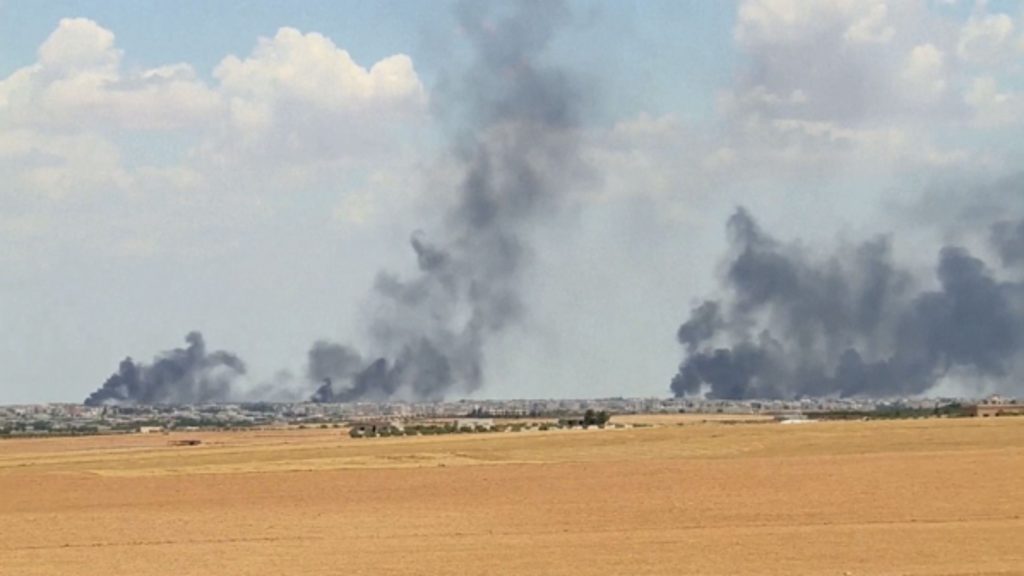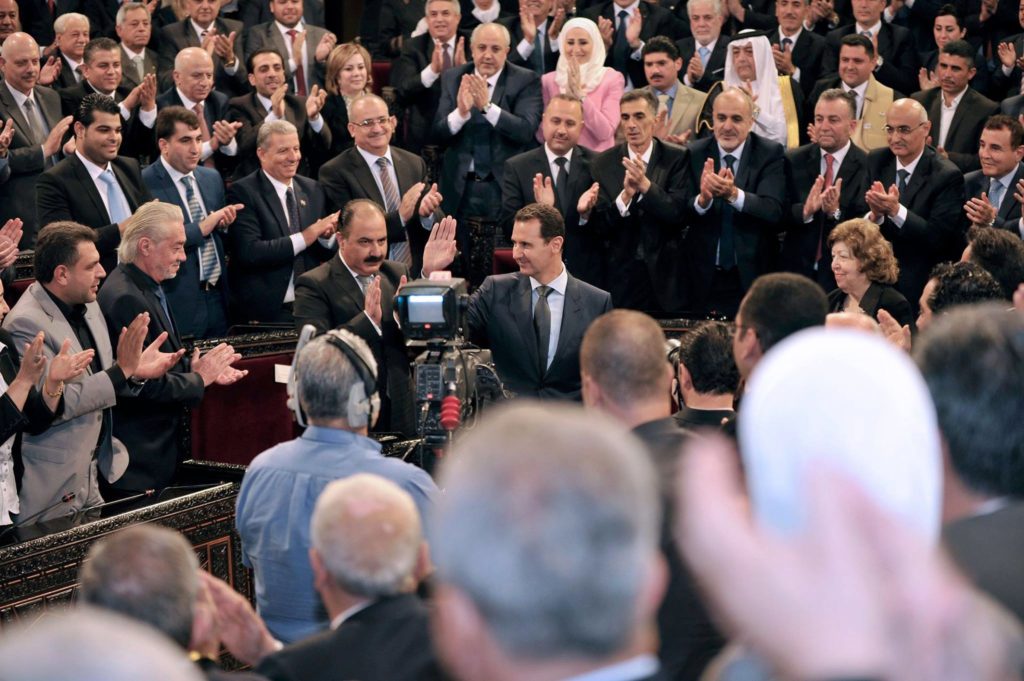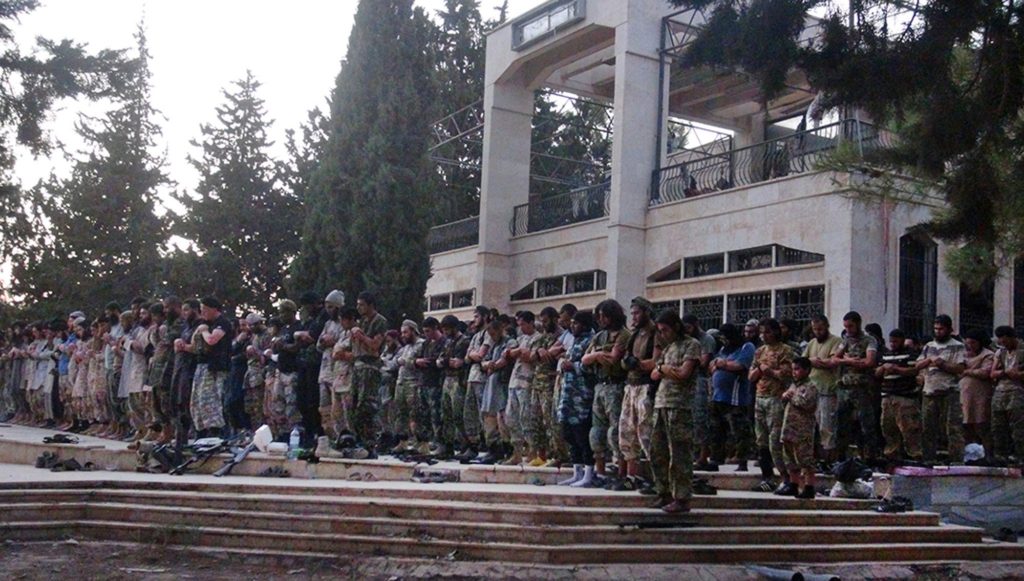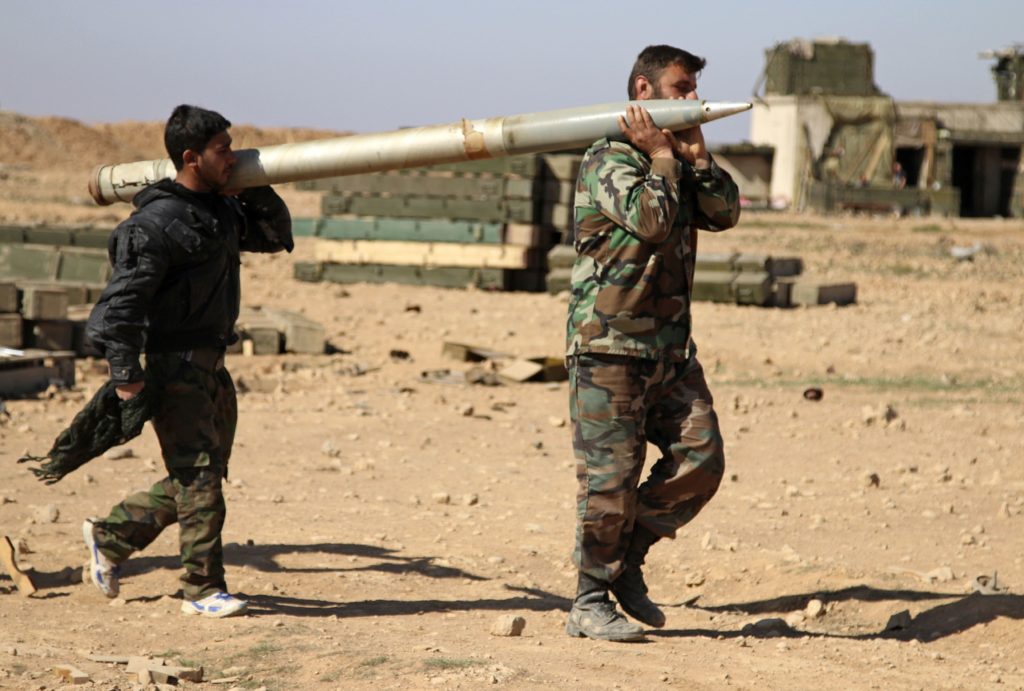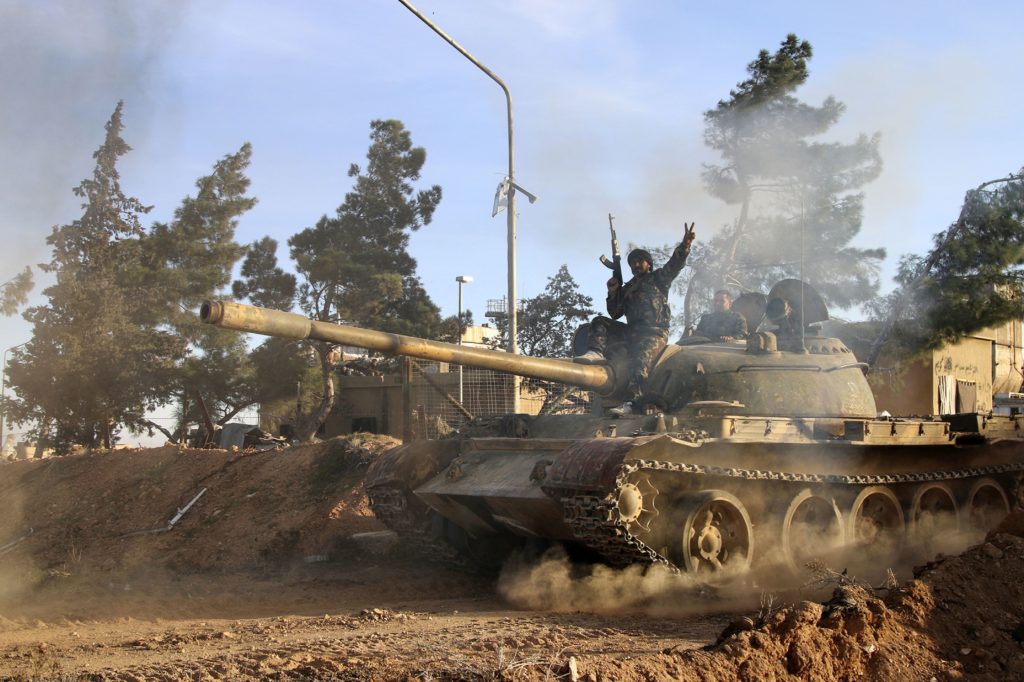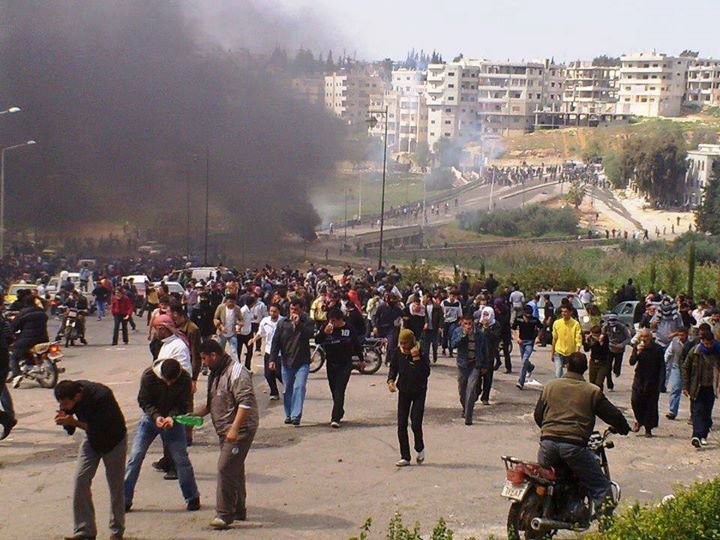From the comfort of a ranch-style home in Westfield, Zaid AlNassar says that the difference between his family’s situation in the strife-torn Middle East and their new life in the U.S. is “like the Earth and the sky.”
The worries of those days seem a world away as his children run in and out of the house, playing and laughing. AlNassar’s wife brings a tray of steaming Middle Eastern coffee and homemade lemon-coconut squares into the living room. Nearby, a TV blares a sitcom in Arabic.
She places the tray on the coffee table and sits down in a nearby chair, bouncing the youngest of their five children, a giggly nine-month-old son on her knee. [AlNassar requested the names of his children and wife not be used in this article due to privacy concerns.] She was pregnant with him when they arrived in November of 2014. A rambunctious three-year-old climbs over her father on the couch and flops down to play a game on an iPad.
AlNassar says he’s grateful his family finally has stability — and safety.
He remembers vividly the moment that their plane touched the runway in New York City. He says he breathed a sigh of relief, knowing for the first time since 2011 that his family was no longer in danger. Representatives from Lutheran Social Services, a resettlement agency now known as Ascentria Care Alliance, greeted the family in the terminal and drove them to their new apartment in Westfield.
The home was fully stocked, right down to the fridge. For days, AlNassar says, he couldn’t believe that he was actually in America. AlNassar’s wife says that arriving in the dark of night, not fully able to see the land, filled her with anxiety. But her fears were soon put to rest.
“As soon as I saw my kids happy, I was happy,” she says through a translator, Yamila Irizarry-Gerould, a Northampton-based writer who speaks Arabic and has lived in Jordan and Egypt.
When his electronics store was partially destroyed by shelling in May of 2013, AlNassar decided that he and his family couldn’t stay in their native Syria any longer. The same neighborhood in which he’d grown up, met his wife, and started a family of his own, the same neighborhood in which his entire extended family lived, was crumbling before his eyes.
Since the 2011 uprisings during the Arab Spring, the AlNassar’s hometown of Daraa — seen as the birthplace of the Syrian Revolution that rose up against the abuses of President Bashar al-Assad — had suffered immensely.
In March of that year, 15 teenage boys were abducted by the Syrian military when they were caught spray-painting anti-regime slogans on a wall, a tactic they’d seen used by protesters in Egypt. Non-violent protests erupted in the streets when the parents of the boys were reportedly told by military commanders, “Forget your children. If you really want your children, you should make more children. If you don’t know how to make more children, we’ll show you how to do it.”
The protests prompted a violent crackdown by the regime, who opened fire on the unarmed civilians, killing four. The strong-arm tactic backfired as the number of protesters taking to the streets swelled into the thousands across the country. As the protests grew, so did the government crackdowns. Protesters were killed by the dozens and eventually the hundreds.
“People would go with olive branches,” AlNassar said through a translator. “And they would meet them with bullets.”
By the end of April, the city was under siege. The regime began indiscriminate shelling of residential neighborhoods in Daraa. Military officers began to defect as they refused orders to brutalize civilians, beginning an armed resistance movement that would soon give rise to the Free Syrian Army. The country fell into all-out civil war and Daraa, like so many other Syrian cities, now lies in ruins; its remaining residents struggling to survive day to day.
AlNassar and his entire family of about a dozen brothers and sisters had grown up on the very block on which the shells were falling. He met his wife there. Their families lived next door to one another and also owned adjacent shops. They’d seen each other every day on the streets on the walk to work.
Following a counteroffensive by Syrian government forces against the rebels in April and May of 2013, AlNassar’s escape routes from the indiscriminate violence that came to characterize life in Darraa had become limited. Jordan, only a few miles away, had closed its border due to the ongoing clashes between Syrian government forces and rebels, so AlNassar and his family piled into their car and drove 73 miles north to the capital Damascus. Along the way, they were stopped at a seemingly endless number of government checkpoints.
At one, he says, officers warned him that if he was on his way to the Zaatari refugee camp in Jordan, they would “follow him and find him.” No, he told them. They were simply going to the hospital to get treatment for his young son who suffers from a liver condition. On the short road from Damascus to Lebanon, there were lots of government checkpoints, too, but they managed to make it through each one, AlNassar says, by just being agreeable and nonconfrontational.
The family found little refuge in Lebanon. The country was beginning to strain under the weight of the more than 356,000 refugees who had arrived by that time. Housing and employment were hard to come by and public services were stretched thin. Today, the number of Syrian refugees living in the country tops 1 million — nearly a quarter of the population. The strong presence of Hezbollah, a Lebanese militant group allied to the Syrian President Bashar al-Assad, was making some uncomfortable.
Once in Cairo, AlNassar went to the Office of the United Nations High Commissioner for Refugees (UNHCR) to apply for refugee status. Over the next 18 months, the family underwent four interviews with UNHCR staff. They asked AlNassar about his compulsory military service, whether or not he’d learned to use a weapon, whether he was for or against the revolution, even personal questions about his mother and father. The family underwent a series of medical screenings aimed at assessing their health. Biometric data was collected to help verify their identities throughout the process.
Then, their information was passed off to U.S. State Department, and they underwent several more rounds of security screenings. These were difficult times, AlNassar says, recounting the anti-Syrian sentiment the family encountered in Egypt, the way that Syrian-run businesses there were driven out by the locals, his inability to find work, and abysmal medical care. Ultimately, his son’s condition was a major reason that the family was able to make it to the U.S., since vulnerable populations are given preference by the U.S. and the UNHCR.
In Westfield, the AlNassars’ new lives began to shape. Ascentria, the resettlement agency, helped the family enroll the children in public school. The kids, who speak English well, say they love their teachers and that they look forward to going every day. AlNassar was placed in a job working for a soy-product manufacturer and he’s taking English as a second language classes through Ascentria. Those arriving under the refugee resettlement program receive $1,000 for each person in the family to begin their new lives, and agencies like Ascentria are only obligated to provide aid for nine months, though they often do so for much longer.
A year and a half after moving to America, the family still faces challenges. For one, their large, tightly-knit extended clan is splintered. One of AlNassar’s sisters, who requires dialysis three times a week and is in desperate need of a kidney transplant, is still living in Jordan. She’s unable to receive adequate, affordable health care because she’s not a Jordanian citizen. Her case for resettlement to the U.S. is still under consideration and the family worries that they’re losing time to get her the medical care she needs.
AlNassar’s English remains limited, making it hard for him to find work. When the soy-product company ran out of work for him, he began driving for the ride-sharing service Uber, which is now his only employment. His wife hasn’t been able to learn English and with five young children at home, two of whom are not yet old enough to attend school, she’s not able to work. They still rely on some transitional assistance through the state to make ends meet.
In January, AlNassar applied for permanent residence, or green card, status which is required before the family can freely travel in and out of the country. They are eager to visit relatives in other countries, but the process can take months or in some cases over a year.
AlNassar says that the heated politics around refugees this election year hasn’t had much of an impact on the family. They say that they’ve received a warm reception in Western Mass and haven’t faced any hostility for being Muslims and refugees. Still, AlNassar says, the idea that limits could be imposed on the number of Syrian refugees resettled in the U.S. is worrisome. The AlNassars still have family members in harm’s way, many of whom are still in Daraa, and they worry every day for their safety.
Following the terrorist attacks in Paris in November 2015, more than half of U.S. governors — including Massachusetts Gov. Charlie Baker— supported a temporary ban on the resettlement of Syrian refugees to their states over concerns that the screening process was inadequate. The announcement came despite the fact that refugees admitted to the United States have legal status and states can not bar them from entering. The Refugee Act of 1980 places authority for the resettlement of refugees on the federal Department of Health and Human Services, in conjunction with the State Department. The law says that states should be consulted on the details of the resettlement process, but not that it can bar any population outright based on their religion or country of origin. Several US Supreme Court cases have shot down the constitutionality of state laws that had sought to exclude them, including a 1915 ruling, Truax v. Raich which stated that an alien admitted to the US under federal laws has the right to live in any state and is entitled to equal protection under its laws. President Obama has called for the resettlement of 10,000 Syrian refugees in the U.S. in fiscal year 2017, while Republican presidential candidate Donald Trump has called for a ban on all Muslims entering the country at a time when nearly 5 million Syrians have fled the country to escape the war.
AlNassar and his family were among the first wave of refugees to flee the country. Watching his country fall apart, he says, brings a kind of sadness that he couldn’t have previously imagined, one that he can’t really describe. AlNassar says that they were expecting that countries would rush to open their doors to help, not watch people drown as they try to cross the Mediterranean Sea.
“These are the children of my country,” he says. “The same blood.”
They’ve lost their country, he says, and it’s never going to be the same again even if they are ever able to return. The civil war continues to rage in Syria, with no end in sight to the sea of humanity flowing over its borders.
Smiling broadly, the nine-month-old takes a few tentative steps on his own. He steadies himself on the couch before he loses his balance and lands on his backside. His father gives him a wan smile.
The child “has to go back and meet Syria, get to know his country,” AlNassar says. “He’s never been.”
Whether he’ll get the chance, or what will be left of Syria if he does, remains to be seen.•
Peter Vancini can be reached at pvancini@valleyadvocate.com. Yamila Irizarry-Gerould can be reached at yamijig@gmail.com.
*Edited on 6/16/2016.

